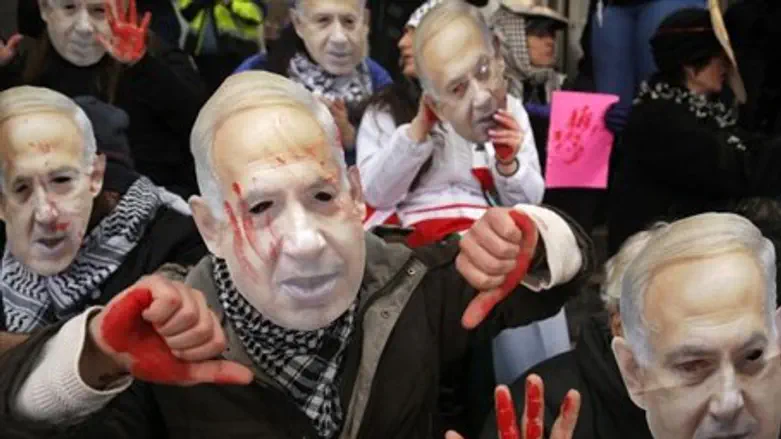
On Monday evening, Honest Reporting and European Friends of Israel organized a discussion on Dr. Manfred Gerstenfeld’s recent book The War of a Million Cuts (read the Arutz Sheva review here.) The volume analyzes the dynamics behind the anti-Israel movement and how it can be fought.
In his introductory statement, the author explained that the main motifs of anti-Israelism and the two classic types of anti-Semitism - religious and ethnic - are the same.
Gerstenfeld - who writes a regular column for Arutz Sheva - said that the core motif of all three is that Jews are absolute evil. Yet the perception of absolute evil has mutated over the centuries.
Christianity, and in particular Roman Catholicism, accused the Jews of having killed Jesus, the alleged Son of God. In Christian eyes there was no worse crime imaginable.
The Nazis saw the Jews as animals and subhuman. This constituted absolute evil in their view. The same motif existed already in many Muslim circles who saw and still see Jews as apes and pigs.
In post-war society absolute evil has again mutated, as "absolute evil" is now seen as being represented by the Nazis and their horrific legacy. Gerstenfeld mentioned several opinion polls which indicate that forty percent of Europeans believe Israel is a Nazi-like state conducting a war of extermination against the Palestinians. He mentioned that he had discussed these polls with a number of high-ranking Israeli officials, who preferred to simply avoid confronting the issue.
At the outset of the meeting, which took place in the Agron Guest House in Jerusalem, Gerstenfeld said that he could only write the War of a Million Cuts because the Israeli government had failed dismally in the battle against propaganda. He pointed out that the only way to fight adequately would have been to set up a counter propaganda structure which would be integrated with activities of the IDF, the intelligence services and the cyber defense unit.
The author claimed that while in each of the three latter activities the top people oversee the entire battlefield for which they are responsible, there are no persons in the Israeli government who have any overview of the anti-Israeli propaganda front.
The Israeli government is therefore unable to understand the fragmented nature of the attacks against it. The huge number of fragmented attacks on Israel are what Gerstenfeld has termed “the million cuts”. Nor are the authorities able to learn from successes or failures of the past, and thus gradually improve the quality of their fight against anti-Israel activities. He added that many people wrongly believe that the Boycott, Divestment and Sanctions campaign is the main problem for Israel. In fact, the main problem is the "Nazification" of the Jewish State within the popular narrative.
After his short introduction, Gerstenfeld was interviewed by Jewish leader and columnist Isi Leibler. The latter asked him why private people could not bring together the funds necessary to set up such a counter-propaganda agency. Gerstenfeld mentioned first the estimated cost of the proposed organization at a sum in the order of magnitude of 250 million dollars per year, which is too large an amount for private organizations.
He also mentioned several other reasons. A private body would be seen by the major Jewish organizations as a competitor, both insofar as general activities and fundraising are concerned. The major Jewish organizations would have no problem collaborating with a government agency, however. In addition, only a government body has the means to hit enemies of Israel where it counts.
If the government would choose to strike out at the media, for example, it had many options. It could expose them at press conferences, refuse to give press cards to some who misrepresent themselves as journalists when in fact they were anti-Israel hate mongers. Yet another reason was that the proposed body would have to cooperate with other government bodies such as the army intelligence organization and the cyber defense unit. That could not effectively be done by a private organization.
Leibler mentioned that he had in vain raised the issue of setting up a government controlled counter-propaganda body with Prime Minister Netanyahu on several occasions, as had others. He said that this probably was due to the fact that the Prime Minister had so many other problems to deal with. He also asked Gerstenfeld why the government didn’t act.
Answering this, Gerstenfeld listed a number of reasons, saying that the Israeli government thinks that as long as exports rise, even to countries with governments hostile to Israel, the propaganda against Israel is apparently not so damaging. Furthermore, the fragmentation of the attacks makes the overall reality difficult to understand for several Israeli cabinet members, who have never lived abroad and have limited understanding of the current culture of the West. To that comes according to the author that many Israeli officials are happy with the aliyah even if it does not result from Zionist convictions but rather from problems in the country they migrate from.
Yet another point Gerstenfeld made was that there is a millennial masochistic tradition among Jews, and many Israelis like Jews think it is normal to be attacked.
He did note however that while there have been many propaganda attacks by its enemies, each of which make Israel bleed a little bit, there hasn’t been a single major success of the anti-Israel propaganda which has created the feeling that something had to be done in a far more serious way than is the case at present. He concluded by way of example the Palestinian Authority's efforts to persuade the international soccer association FIFA to expel Israel, which ultimately flopped.
It may well take an event of that magnitude to force the government to finally take the million propaganda cuts against the country seriously, he opined.